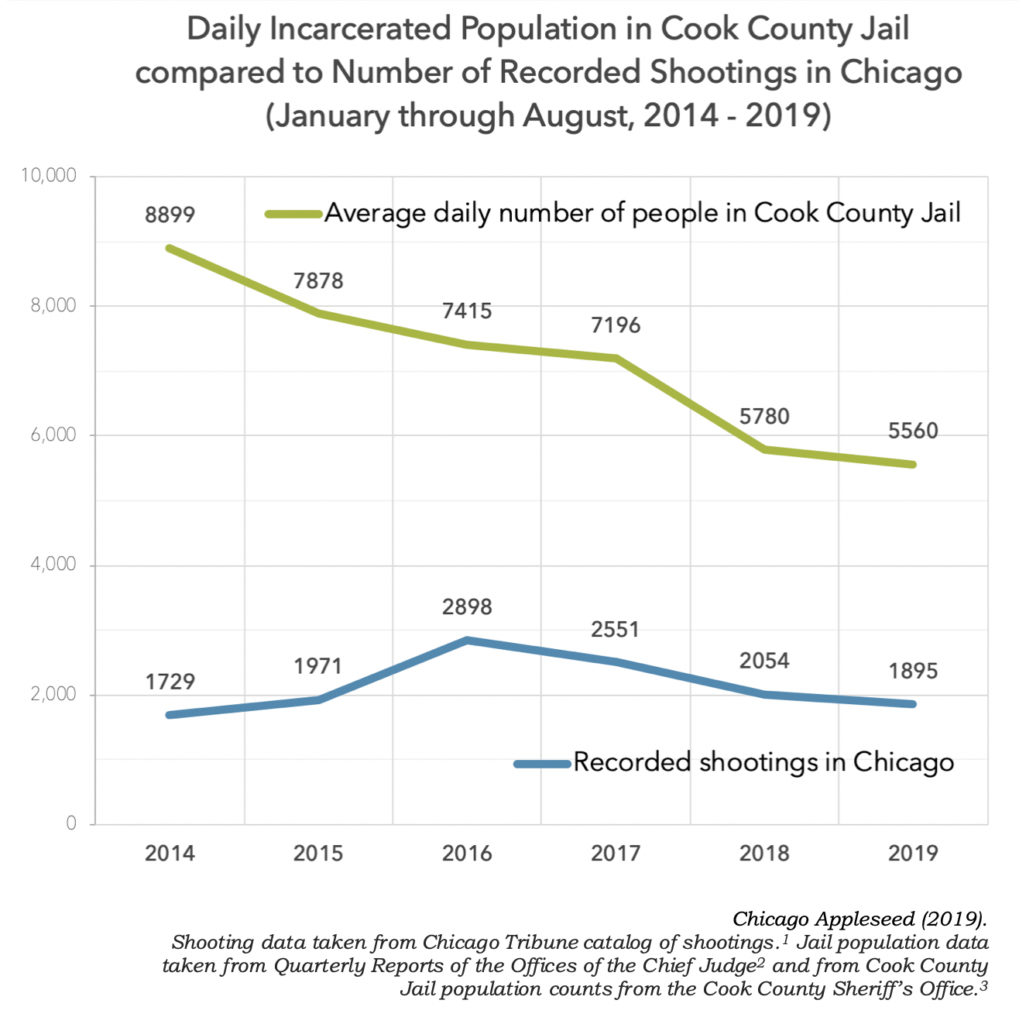Chicago Tribune Reports Excellent News about State’s Attorney Kim Foxx’s Reformist Policies (Even if they Framed it as an Attack)

Both this morning and yesterday, the Chicago Tribune published an editorial and an analysis, respectively, attacking bail reform in Cook County and the State’s Attorney’s (SA) felony dismissal rates. The information published in their report on SA Kim Foxx is well-analyzed, and – despite the Tribune’s best efforts to paint it negatively (and double-down on that criticism in their editorial) – is an overwhelmingly positive sign that bail reform works and that Kim Foxx is delivering on her campaign promises and setting the priorities of her office to focus on public safety.
The Tribune’s own analysis of SA Foxx’s data shows that she is committed to holding police accountable for their conduct, expanding diversion opportunities for non-forcible felonies, and being judicious about whether charging someone with a felony is the appropriate response when that person or crime does not pose a physical threat to anyone.
The job of a prosecutor is not only to win cases, but to fight for justice and community wellbeing. Part of this job is to decide what charges to pursue in the first place; another part is to decide if bringing charges is justified at all. Anytime a person is charged with a crime, tremendous amounts of resources are expended to prosecute that alleged offense, and the consequences for that person and their family are great. They may be held in custody, away from their family and unable to work, until the case is completed – even if they are innocent and it takes months (or years) to prove it. Prosecutors, defense attorneys, and judges must dedicate time and energy to ensure a case is fairly and properly heard. And, of course, much – if not all – of that work is funded by local governments who were already struggling before COVID-19 ravaged their budgets.
Charging a crime is a hugely consequential decision, and one that must be done thoughtfully. Our criminal legal system is not a cure for the structural racism, predatory capitalism, and other underlying social ills which often fuel delinquent behavior; indeed, data continually shows that – for many crimes – prosecution and incarceration actually cause more harm than good for individuals, families, and entire communities. In October, 2019, Chicago Appleseed, Chicago Council of Lawyers, The People’s Lobby, and Reclaim Chicago published the perspectives of defense attorneys who had worked with both Anita Alvarez and Kim Foxx during their tenures as Cook County State’s Attorneys. During Alvarez’s time in office, defense attorneys reported regularly unreasonable behavior by prosecutors in pushing cases forward where there was little-to-no evidence, seeking convictions even in cases where defendants were clearly innocent. This kind of “win-at-all-costs,” “tough on crime” mentality by prosecutors has been one of the main drivers of mass incarceration in the United States.
The categories of cases highlighted in the Tribune’s August 10 story show that SA Foxx is doing exactly what she was elected to do: promote justice in our criminal system and lessen the impact of the system on Chicagoans charged with “non-violent” crime – particularly those criminalized for their poverty, mental health and substance abuse issues, or housing instability.
- NARCOTICS | The State’s Attorney’s dismissal rates in drug cases reflect a major investment in diversion programs. SA Foxx has doubled the use of diversion programs for narcotics cases, which allow people charged with drug offenses to receive community-based treatment and evaluation rather than felony drug charges. This is an unequivocally evidence-based approach to drug-related offenses – one that should be commended. The war on drugs and the heavy criminalization of drug possession is well known to be the primary driver of unnecessary mass incarceration.
- “ESCAPE” FROM ELECTRONIC MONITORING | Importantly, this charge is misleadingly-named; “escape” does not necessarily mean that someone fled court-ordered supervision or removed their ankle monitor. The “Escape from Electronic Monitoring” statute in Illinois allows the Cook County Sheriff’s Office to ask for a participant to be charged with a Class 3 felony if they allegedly violate the often-draconian rules of the EM program. When the State charges someone only with “Escape,” it means they are not accused of committing any felony when they were apprehended – their only crime was not following the Sheriff’s rules. These cases where Escape was the only charge were the exact cases that the Tribune examined. The rules of Cook County’s Electronic Monitoring program are untenably restrictive, requiring 72-hour notice for any movement outside one’s home, including for medical appointments and job interviews, and ignores issues of housing instability and any other emergency situation. We commend SA Foxx for using her discretion (the discretion she was elected and has every right to use) to decide when someone should be charged with a felony for allegedly breaking a pretrial monitoring program’s rules without being accused of any other crime.
- FAILURE TO REGISTER | Sex offender registries are life-long, with extremely restrictive requirements. A person can be arrested for a felony “Failure to Register” charge for missing a deadline, even if they have been otherwise compliant with the requirements for years. When people on the registry are homeless – a common occurrence because of the restrictions on where people on the registry can live – by law, they must register in person at a police station every 7 days or risk a felony. Again, State’s Attorney Foxx is absolutely right to use her discretion to only charge violations of the registry that create an actual risk to the community, rather than punishing everyone who fails to comply with harsh, draconian rules.
- RETAIL THEFT, CREDIT CARD, AND FRAUDULENT ID | These non-violent property crimes are often sent to deferred prosecution programs under SA Foxx’s administration. They are the exact kinds of low-level, “non-violent” cases that tend to be motivated by poverty and substance issues that SA Foxx has always promised her office would de-prioritize.
- AGGRAVATED BATTERY OF A PEACE OFFICER | The Chicago Tribune also notes that under Foxx, the State’s Attorney’s Office has increased dismissals of “Aggravated Battery of a Peace Officer” charges. What the article fails to report is that these charges have historically been used as “cover charges” for police brutality – especially in Chicago. Police have repeatedly avoided charges of brutality (and often a civil rights suit in the long term) by alleging that the arrested person touched them aggressively. The Chicago Reporter’s excellent 2018 article documented this practice extensively. Refusing to be complicit in bad faith charges for “Aggravated Battery of a Peace Officer” is exactly what a competent prosecutor should be doing; higher dismissal rates of those charges than others suggests that SA Foxx is making a concerted effort to address this structural problem.
In short, all the facts the Tribune reports in its August 10 analysis are an excellent sign – concrete evidence – that State’s Attorney Foxx has enacted several of the reforms she promised during her campaign.
Any notion that bond reform or the policies of the Cook County State’s Attorney have caused a “crime wave” in Chicago is simply untrue. Interpersonal, community, and systemic violence violence are impediments to human wellbeing in this city, and it is vital that politicians and policy makers continue to prioritize the anti-violence work that has clearly warranted positive results. The intersection of bond reform, justice-focused prosecution, and a movement toward decarceration has led to a sharp drop in crime. In the summer of 2019, the average number of people locked up in Cook County Jail on any given day was 25% lower than it was in 2016; even still, the number of recorded shootings in Chicago from January to August of 2019 was down 35% compared to what it was during the same time period in 2016. Sensationalizing the civil unrest in Chicago may serve political narratives – acting as a vehicle to propose tougher, more punitive (and continually disproven) “tough on crime,” “law and order” policies – but it absolutely does not serve Chicago’s communities.
If anything, the Chicago Tribune should be using their analysis to recognize the Cook County State’s Attorney’s commitment to fulfilling her electorate’s priorities. Reporting on these dismissal rates as if they are a problem, rather than a sign of progress, shows that the Tribune is simply out of step with popular opinion on criminal justice locally and nationally. Kim Foxx just survived a serious Democratic primary challenge focused directly on these so-called “tough on crime critiques.” Foxx defeated her challenger by 19 points – 28 points in the city of Chicago itself. Her election signaled that the people in Cook County agree with Kim Foxx’s approach to prosecution, and want her office to be doing exactly what it IS doing – focusing prosecution on violent crimes while decreasing the disproportionate harm for mostly poor, Black, and Latinx people faced with low-level narcotics offenses, property crimes, and technical violations.
For more information on bond reform in Cook County, visit the Coalition to End Money Bond’s blog: https://endmoneybond.org/2020/08/11/ending-money-bond-makes-black-lives-matter/.

